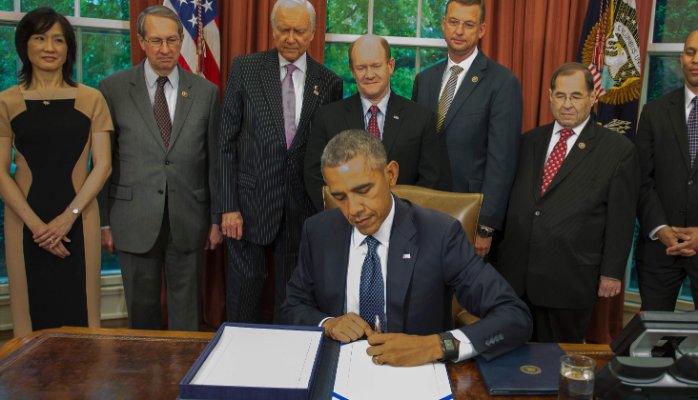Last week President Obama signed into law the Defend Trade Secrets Act (“DTSA”) of 2016, creating the first-ever U.S. federal law providing civil remedies for misappropriation of trade secrets. The law became effective immediately, with serious implications for domestic and foreign companies selling goods or services in the United States.
In the U.S., trade secret theft was already prohibited by civil laws in every state and by federal criminal law in the Economic Espionage Act (“EEA”) of 1996. However, proponents of the DTSA had argued a federal law was needed to bring greater uniformity to civil trade secret actions and provide new tools to combat the growing threat posed by the theft of trade secrets.
The DTSA adopts the EEA’s broad definition of “trade secret,” as financial, business, scientific, technical, economic, or engineering information, whether tangible or intangible, regardless of how it is stored, provided (a) reasonable measures are employed to maintain the secrecy of the information and (b) it derives economic value, actual or potential, from not being generally known to other persons, or readily ascertainable through proper means.
Victims of trade secret theft may sue under the DTSA if the stolen secret “is related to a product or service used in, or intended for use in, interstate or foreign commerce.” Thus, if a Chinese company solicits employees of a Taiwan company to steal secrets from their employer relating to goods sold in the U.S., the Taiwan company may sue both the former employees and the Chinese company in the U.S. under the DTSA, gaining the strategic advantage of U.S. federal litigation and discovery.
The Act only requires a secret to be “related to” goods or services, in order to file suit, so presumably secrets may relate to design, manufacture, marketing, sales, customers, suppliers, pricing information or many other areas of sensitive information “related to” a product that is sold or intended for sale in the U.S.
Some complain that the DTSA fails to enhance uniformity, because it does not preempt state trade secret laws; instead, one may file suit under state law, federal law or both. Of course, victims of trade secret theft should appreciate that, as it enables counsel to compare the various state and federal laws and file suit in the court(s), applying the law(s), which are most advantageous to the client.
Remedies under the DTSA include damages, exemplary damages (up to twice the amount of actual damages), injunctive relief, attorney fees and, notably, ex parte civil seizure. In “extraordinary circumstances,” a plaintiff may apply to the court, without notice to the other party, for an order allowing it to seize “property necessary to prevent the propagation or dissemination of the trade secret.” To obtain such an order, one must post adequate security with the court and prove that immediate and irreparable harm would occur absent the seizure and other forms of equitable relief would be insufficient.
The Act contains a whistleblower immunity provision, exempting from criminal or civil liability those who disclose trade secrets in confidence to an attorney or government official for the purpose of reporting a violation of law. It also requires employers to reference that immunity provision in all confidentiality agreements with employees, contractors or consultants; failure to reference that provision may result in forfeiture of the right to recover attorney fees under the Act.
The Act also increases penalties for criminal violations from $5 million to the greater of $5 million or three times the value of the stolen trade secrets. To grasp the significance of that amendment, consider the Epic Systems v. Tata Consultancies case, which was decided just last month, with a jury awarding Epic $240 million in compensatory damages and $700 million in punitive damages in a state-law, civil trade secret case. Following passage of the DTSA, criminal penalties in a case of that magnitude could be as great as $720 million, compared to just $5 million before passage of the Act.
So what are the practical implications?
First, as with any trade secret law, the definition of trade secrets requires a company to take reasonable measures to maintain the secrecy of its confidential information, so companies should recognize the critical importance of implementing a sound trade secret protection program – not just to prevent the loss of secrets in the first place, but to ensure that one has a right to legal remedies when (not if) secrets are stolen.
Second, any company that sells goods or services in the U.S., or intends to, should promptly consult with an attorney who is familiar with the DTSA, to ensure that all of its agreements with employees, consultants and contractors that contain confidentiality provisions include proper language to avoid losing the right to recover attorney fees under the Act.
Third, in the event of a theft of trade secrets, a company should promptly consult with qualified counsel who can advise the client on the pros and cons of filing suit in various forums, applying various laws – including state or federal law, or both – so the client can select the most promising strategy.
– – – – – – – – – – – – – – – – – – – – –
If you have any questions concerning trade secret protection or enforcement, feel free to drop me a line at chrisneumeyer(at)asialaw(dot)biz

